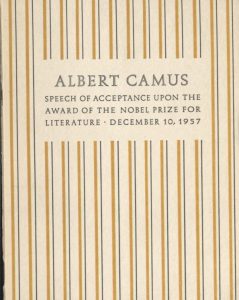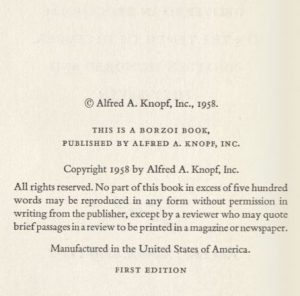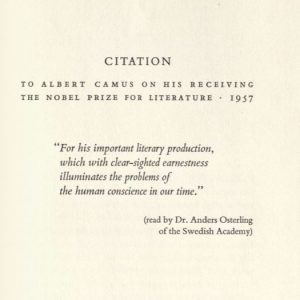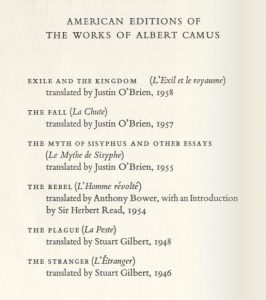Camus’ Nobel Prize”: Mission of a Writer by Ridge R.
My object is a 1958 edition of Albert Camus’ Nobel Prize for Literature Acceptance Speech given in December of the prior year. The speech is published in a book form, with each page containing not very many words. This makes me assume the dimension of the object is probably close to that of a mass market paperback. The translation of the speech into English was done by Justin O’Brien, who also translated Camus’ works from 1955-1958 judging by the last pages of the publication. The cover of the book does not suggest much about the content of the speech, it being downward yellow stripes. This speech is published by Alfred A. Knopf in America, likely for an American audience.
For a contemporary, 21st century audience, it is a different experience to read a speech. In recent memory, most famous speeches are done in public, and usually recorded in audio and video form. The audience is able to grasp the ideas that the speaker presents and react to it by clapping or even cheering. In this case, the speech was likely done in front of a select group of people in Stockholm, where they present the Nobel Prize. The Nobel Prize is awarded in the center of a town hall, and only seats a few hundred (once went to that building on vacation). Without audio or video, it is difficult to know what the audience reaction was. However, this can be a blessing in disguise since the reader can reflect on it independent of other people’s perception. I think much of Camus’ work is about the purpose of life and rather it has any inherent meaning. As someone who did not subscribe to a religion, Camus’ work can be read rather hopelessly. Camus himself clearly presents a purpose for his writing, and characterizes writers in general as servicing truth and freedom. These qualities are examined in An Adulterous Woman and I think Camus embodies his definition of a writer. Although he made suggestions that he was not entirely deserving of the reward, he was sincere and serious in his messaging. While reading the short story, sometimes I felt it was very theatrical for a woman to come into a moment of self-realization during a mundane event.
The Nobel Prize Committee awarded this prize to Camus with this reason, “for his important literary production, which with clear-sighted earnestness illuminates the problems of the human conscience in our time. ” An Adulterous Woman reflects all of those things and as a reader, I think award winning authors or books are generally taken more seriously. It does not mean everyone will like it, but more people will give it their time and reflect upon them.
Delving deeper into the succinct reasoning that the Nobel Committee gave, I found other winners of the same prize that we discussed in “Modern European Short Fiction”
The Nobel Prize in Literature 1929
Thomas Mann “principally for his great novel, Buddenbrooks, which has won steadily increased recognition as one of the classic works of contemporary literature.”
The Nobel Prize in Literature 1964
Jean-Paul Sartre “for his work which, rich in ideas and filled with the spirit of freedom and the quest for truth, has exerted a far-reaching influence on our age”
The Nobel Prize in Literature 1969
Samuel Beckett “for his writing, which – in new forms for the novel and drama – in the destitution of modern man acquires its elevation”
Thomas Mann’s prize is distinctive since the committee pointed out a specific work that was worthy of the prize. Beckett’s mentions his contribution to both novel and plays and his contribution to the “modern man.” Sartre, once a friend of Camus, has a similarly ambiguous citation mentioning freedom and truth as key aspects of his writing.
Readers should also consider that the committee members change over time, so does the perception of certain authors and their works. Mann for example is likely better known in America by “Death in Venice” and longer works such as The Magic Mountain.














Recent Comments